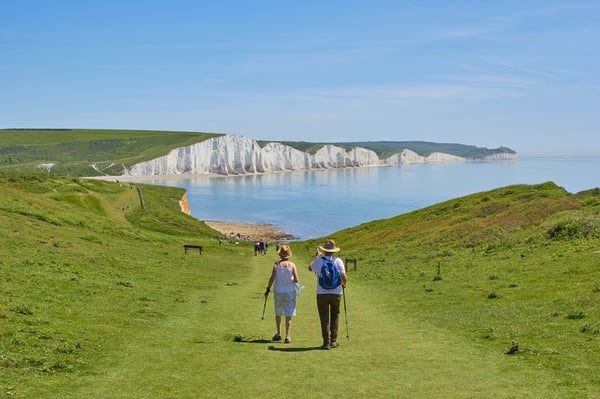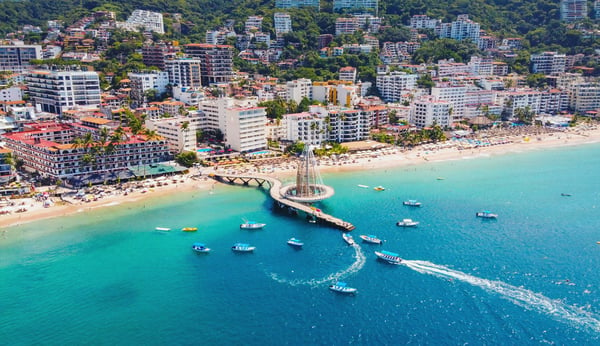In a recent article, we covered the wide range of benefits on offer for Brits looking to retire abroad. We also ran through some of the practical elements you should consider before planning such a move, such as paying for healthcare and securing residency post-Brexit.
While the most popular retirement destinations for British pensioners have historically been Spain and France, it's understandable that some retirees may be looking elsewhere post-Brexit. Residency in the EU is less straightforward right now, and Brits are no longer automatically entitled to the same rights as locals. We've gathered information about a few countries that are fast becoming popular retirement destinations for their low living costs, accessibility and easy-to-navigate health system.
Receiving your pension abroad? Avoid hidden currency exchange fees when transferring a pension overseas. 
#1: Why retire abroad in Bulgaria?
Often overlooked as both a holiday and retirement destination, Bulgaria boasts stunning natural landscapes with opportunities for relaxing by the coast in summer and skiing in winter. If walking's your thing, there are also some fantastic hikes to enjoy.
Value for money
Bulgaria is, on average, 54% cheaper than living in the UK, including accommodation. Around £300 per month will cover rent on a nice two-bedroom apartment in a pleasant neighbourhood of the country's capital, Sofia. Food shopping, getting around and eating out are also inexpensive.
Your pension and other incomes will be taxed at a flat rate of 10%, in contrast to the UK's 20-45%. You can also enjoy a tax-free allowance of approx £3,500 per year. However, as there's no social agreement between the UK and Bulgaria, your UK state pension will be frozen at its current rate upon first payment in the country and you shouldn't expect any increases linked to inflation.
Accessibility
On arrival in Bulgaria, non-EU retirees looking to settle there must apply for a Bulgarian Pensioner D visa and temporary residence permit at the Bulgarian embassy or consulate. After your Pensioner D visa is approved, you're able to apply for a residence permit which is granted for a period of up to 12 months and can be renewed annually.
You'll need proof of your pension, address, health insurance and that you have a bank account in Bulgaria. Your monthly income should at least be equal to the national minimum monthly wage (currently approximately £280), for you to be considered financially independent.
The catch? You may need to learn Bulgarian, in the likely event that you don't already speak the language. You should get to grips with the basics, at the very least, as you'll need some Bulgarian to get by.
Healthcare
Expats can enrol in the Bulgarian healthcare system once they have residency. You'll need an S1 form, and you'll then be eligible to access state-funded healthcare with GP care, specialist referrals and low cost prescriptions.
However, it's usually recommended to take out private health cover as well, if you can afford it, as the standard of the private health system is considered superior. A basic plan will set you back approximately £150 per year.
#2: Why retire abroad in Greece?
Greece and its islands have long been a popular holiday destination for Brits, for its fantastic weather, sandy beaches and delicious food. It's also a surprisingly affordable destination for retirees.
Value for money
Living in Greece is approximately 34% cheaper than the UK, with property prices generally inexpensive. For example, rent on an inner-city apartment in Athens will cost you from £400. Food shopping and eating out are also much cheaper than back home.
Greece is also attempting to entice foreign pensioners with the promise of 7% tax on retirement income, which UK retirees would qualify for as part of a double taxation agreement with the country. However, to be eligible, you must have been a tax resident in Greece for five of the six previous financial years. So if you're keen to take advantage of this benefit within the next five years - get packing your bags!
Accessibility
Now that the UK is no longer a member of the EU, Brits looking to retire in Greece must undergo a thorough immigration process which includes proof of financial independence, health insurance, a local address and a health certificate from a Greek public hospital. And all documents will be in Greek, so you might need to enlist some local help in order to secure your residency.
However, if you're looking to invest in property in Greece, you might want to consider the Golden Visa programme. Investing approximately £217,000 (US$250,000) in property will get you residency in 60 days. You'll also need to secure a Greek tax number and Greek bank account within this time.
Healthcare
You'll need to apply for an S1 form to get state healthcare for British residents in Greece, and you'll then receive healthcare provision on the same basis as Greek citizens. In order to qualify for an S1 form, you must be in receipt of a UK exportable benefit, such as a state pension. You can also opt for private health cover once your residency is confirmed, which you can expect to cost from £100 per person per year (depending on your age and any pre-existing health conditions).
#3: Why retire abroad in Malaysia?
Aside from the beautiful landscape, Brits are attracted to this Asian paradise for its low cost of living, abundance of amenities, delicious food, friendliness of locals and familiarity in terms of language.
Value for money
Malaysia is the most expensive option in our top retirement hotspots, but is still more affordable than the UK. For £500-£700, you can rent a large, secure apartment with three or four bedrooms, three to five bathrooms, a balcony with a sea view and shared gym and pool. And if you're not wedded to living by the coast, you can rent a two- or three-bedroom place inland for around £400-£500. Basically, you could easily live on less than £1500 a month. Of course, you'll need to factor in travel to and from Malaysia, and this cost alone could set you back thousands within one year, if you're planning multiple trips home.
Malaysia also has a double taxation agreement with the UK, so you'll avoid paying taxes twice.
Accessibility
Many British expats find Malaysia incredibly accessible. English is Malaysia's unofficial first language - so it's a great choice if you'd rather move to a place where English is widely spoken. Malaysian law is based on the British system and all road signs are in both English and Malay. You'll also be able to pick up food at your local Tesco - you'll feel right at home.
The simplest way to obtain a visa to stay in Malaysia is to apply for a Malaysia My 2nd Home Visa (MM2H). It gives you the right to settle in the country for 10 years, and you can leave and go back multiple times. To qualify, you must have £69,487 (MYR 350,000) in liquid assets, be in good health with no criminal record.
Healthcare
For expats residing on a MM2H visa, you must get a private medical insurance policy covering your stay. Hospitals in Kuala Lumpur are world-class, and the Malaysian health system is very efficient. In fact, over one million foreigners seek treatment in its major hospitals each year. The waiting lists are not as long as in the UK, and prescriptions are affordable.
#4: Why retire abroad in Turkey?
Turkey has a diverse landscape, with mountain ranges that run parallel to the coasts, resulting in very different conditions from one region to the other. Inland, you can experience extreme temperatures with hot summers (up to 42°C) and cold winters, while the coastal areas enjoy milder climates. It also offers inexpensive private healthcare so is a great choice for many British retirees.
Value for money
Living costs in Turkey are approximately 65% lower than in the UK, with a 3-bedroom apartment in the centre of Antalya costing you around £230. If you're looking to invest in property, a 100 sqm property there should set you back just £35,000.
You'll be able to get your UK state pension paid into a Turkish bank account, if you choose, and it will be uprated in line with inflation. Like Greece and Malaysia, the UK also has a double taxation agreement with Turkey so you won't be taxed twice.
Accessibility
You need a residence permit if you'd like to retire in Turkey permanently, and for that you'll need either a rental contract or title deeds, and proof of savings or income showing that you can afford to live there. Alternatively, you could apply for a Turkish passport, which can be done in 2 months through property investments from around £217,000 ($250,000).
You'll also need to learn some Turkish, if you're planning to retire there, as few people speak English. It's not the easiest of languages to master, but at least the alphabet is the same so you won't need to learn an entirely new script.
Healthcare
After one year of residency, expats can join the Turkish public healthcare system for a fee of around £50 per couple. Private cover is recommended - a basic health plan will cost you from approximately £52 per month.
Assessing your options when it's time to retire abroad
Perhaps it's time to enjoy the fruits of your life's labour, and retire abroad in a location that matches your interests and budget. If you decide you want regular walks along a sandy beach, a more comfortable home, and weekly meals out, then perhaps retiring abroad is for you. If you happen to have a flair for languages, and don't mind a little visa-related paperwork, then so much the better.
Consider the options we've presented above, but bear in mind that this is in no way an exhaustive list. Think about your own interests and your personal preferences for either sun or snow. Put together a realistic budget. Travel is set to open up again in late 2021, so this is the ideal time to start planning your life abroad.
Receiving your pension abroad? Avoid hidden currency exchange fees when transferring a pension overseas.
Photo by Alexandre Chambon on Unsplash
Sources:
https://www.investopedia.com/retirement/best-countries-to-retire/
https://www.movehub.com/blog/top-10-countries-brits-choose/
https://expatra.com/articles/retire/best-place-retire-abroad/
https://expatra.com/articles/retire/cheapest-countries-to-retire/
https://internationalliving.com/the-best-places-to-retire/?utm_source=pr&utm_medium=pr-organic&utm_campaign=press-release
https://www.bbc.co.uk/news/uk-46632854
https://www.telegraph.co.uk/money/consumer-affairs/number-uk-pensioners-living-eu-falls-five-year-low/
https://whentheygetolder.co.uk/quality-of-life/lifestyle/retirement-living/5-reasons-to-retire-overseas/












